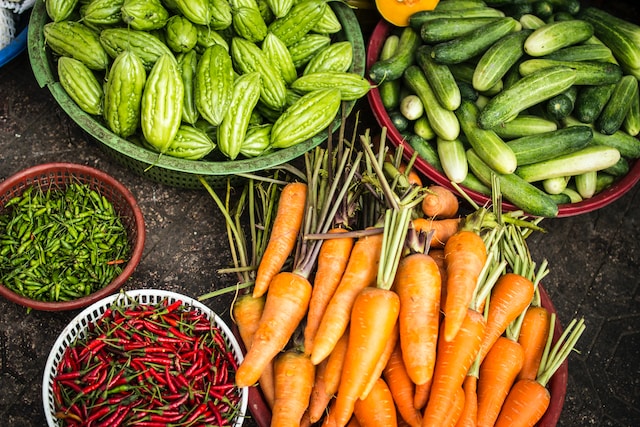Vegetables, nature’s bounty, have always held a cherished place in our diets. These vibrant and versatile foods are not only delicious but also packed with essential nutrients that promote good health. From leafy greens to colourful peppers, vegetables play a vital role in maintaining our well-being.
The Diverse World of Vegetables
Vegetables encompass a vast array of options, catering to different tastes and dietary preferences. Leafy greens like spinach and kale offer an abundance of vitamins A and K, while cruciferous vegetables such as broccoli and cauliflower are rich in fibre and cancer-fighting compounds. Root vegetables like carrots and sweet potatoes provide beta-carotene for healthy vision and antioxidants to boost our immune system. Tomatoes, bell peppers, and cucumbers offer vitamins C and A, essential for skin health and immunity.
Nutritional Powerhouses
Vegetables are nutritional powerhouses, boasting an array of vitamins and minerals. Most vegetables are low in calories, making them an excellent choice for weight management. They are also rich in dietary fibre, which aids digestion and helps control blood sugar levels. For instance, a single cup of broccoli provides more than 100% of your daily vitamin C requirement, while sweet potatoes offer a generous dose of vitamin A in the form of beta-carotene visit https://www.francaisonlinecasinos.net/.
Diverse Flavour Profiles
One of the remarkable aspects of vegetables is their diverse flavour profiles. From the earthy taste of mushrooms to the sweet and crunchy nature of bell peppers, vegetables add depth and complexity to our meals. Herbs like basil and cilantro infuse dishes with fresh, aromatic notes, enhancing the overall dining experience. This variety allows for endless culinary creativity, making vegetables a staple in cuisines worldwide.
Health Benefits Galore
Regular consumption of vegetables is associated with a multitude of health benefits. The fibre in vegetables aids in maintaining a healthy weight and preventing constipation. Moreover, their rich antioxidant content helps reduce the risk of chronic diseases like heart disease and cancer. The potassium in vegetables like potatoes helps regulate blood pressure, while the phytonutrients in spinach contribute to strong bones.
Versatility in Cooking
Vegetables can be prepared and enjoyed in numerous ways. Whether they are raw, steamed, roasted, or sautéed, vegetables retain their nutritional value and flavour. Raw vegetables make for excellent snacks, while roasted vegetables with a drizzle of olive oil and a sprinkle of herbs create a delectable side dish. Vegetable soups, stir-fries, and salads offer endless possibilities for incorporating these nutritious ingredients into our diets.

Environmental Sustainability
The cultivation and consumption of vegetables are not only beneficial for our health but also for the environment. Vegetables generally require fewer resources, such as water and land, compared to animal-based foods. Embracing a plant-based diet can significantly reduce our carbon footprint and help combat climate change. By supporting local and sustainable farming practices, we can further contribute to a greener and healthier planet.
Conclusion
Vegetables are a vital part of our daily diet, offering a wide range of nutrients, flavours, and health benefits. They not only promote well-being but also contribute to environmental sustainability. Incorporating a colourful variety of vegetables into our meals is a delicious and responsible way to nourish our bodies and protect the planet. So, the next time you sit down for a meal, remember to celebrate the nutritional powerhouse that is the world of vegetables.















